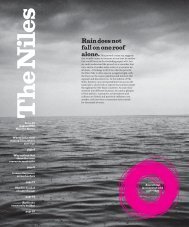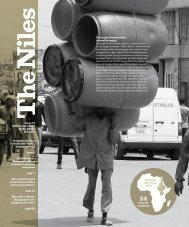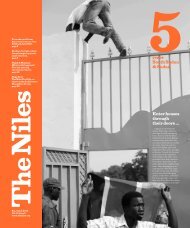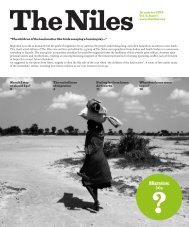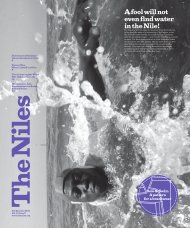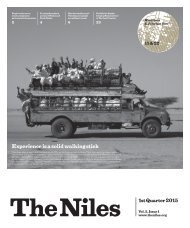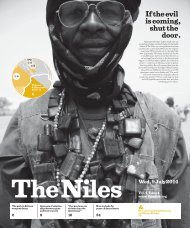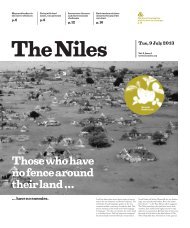When deeds speak, words are nothing
Speaking about sustainable development is easy. Acting sustainably is another matter. And now the evidence is unequivocal: Mankind’s impact on nature is causing the climate to change rapidly and drastically, threatening the environment and the very resources we need to survive. Aware that humanity is careening close to the edge, The Niles correspondents set out to explore where and how people in the Nile Basin region rethink. So much of their findings for now: We are an endlessly innovative species. Cooperation is our superpower. When deeds speak, words are nothing.
Speaking about sustainable development is easy. Acting sustainably is another matter. And now the evidence is unequivocal: Mankind’s impact on nature is causing the climate to change rapidly and drastically, threatening the environment and the very resources we need to survive. Aware that humanity is careening close to the edge, The Niles correspondents set out to explore where and how people in the Nile Basin region rethink. So much of their findings for now: We are an endlessly innovative species. Cooperation is our superpower. When deeds speak, words are nothing.
Create successful ePaper yourself
Turn your PDF publications into a flip-book with our unique Google optimized e-Paper software.
“We lose
a staggering
amount
of water.”
For instance, it supports the improvement
of water use efficiency in major water-use
sectors, strengthening river basin monitoring
and data analysis. It also promotes conjunctive
use of surface and groundwater resources
and improves the preparedness for flood and
drought risks in the Nile sub-basins.
“There are huge information gaps in the
basin, which need to be plugged urgently to
improve the basis for decision-making on critical
water resource management issues,” says
Mwasiti Ally Rashid, Programme Officer for
Water Resources Management and Development,
NBI Nile Equatorial Lakes Subsidiary Programme
Coordination Unit (NELSAP-CU).
Following the conclusion of the first phase
of the study on strategic water resources assessment
in 2017, the second phase of the study,
which started in 2018, focused on updating
the baseline condition from the first phase,
developing refined projections of water demands
for the years 2030 and 2050 and carrying out
a detailed study of the options identified in
the first phase.
The strategic options include water-saving
and other measures for enhancing water supply,
including desalination and reuse of drainage
water from irrigation and municipal uses. The
options are of strategic importance in ensuring
that the growing demand for water in the Nile
Basin is addressed more sustainably.
Another groundbreaking project in the
works is the Nile Basin Regional Hydromet
project, which will inform national planning
and evidence-based decision making by
enabling Burundi, DR Congo, Ethiopia,
Kenya, Rwanda, South Sudan, Sudan, Tanzania
and Uganda to share reliable data and knowledge
for better monitoring of the Nile’s water
resources.
“Water resources data and information
are needed to ensure that investment planning
is well-informed. Through the Nile Regional
Hydromet System, the countries will put
in place real-time information and data sharing
protocols, mechanisms, and agreements, as
well as data processing and analytical models
and toolkits to be used for strategic water
resources analysis for identification of sustainable
development and feasible investments,”
said Rashid.
A recent USD 5.3 million groundwater
project commenced in June 2020 and aims
to improve the understanding of available groundwater
resources and demonstrate how to optimise
surface and groundwater joint use.
A study on groundwater availability in the
Eastern Nile Basin has already been completed
to make a preliminary assessment of groundwater
resources (mapping, recharge and safe
yield) and the potential use of groundwater
for irrigation and domestic use.
The five-year project funded by the Global
Environment Facility (GEF) covers three shared
aquifers involving seven NBI countries, including
those which share the Kagera aquifer
(Burundi, Rwanda and Tanzania); Mt. Elgon
aquifer (Kenya and Uganda) and the Gedaref-
Adigrat aquifer shared by Ethiopia and Sudan.
Cooperation will be crucial in the future
with millions of more people and less water
in the Nile Basin. Dr. Solomon Asiimwe, a
senior lecturer of governance at Uganda Martyrs
University, told The Niles that the Nile River
is the lifeblood for all countries that share it.
For Egypt and Sudan, the reality is even more
glaring. Asiimwe said that there is no alternative
other than cooperation for all the countries
that make up the Nile Basin.
Mekdelawit Messay Deribe, an Ethiopian
civil engineer and environmental scientist
currently a PhD student at Florida International
University’s Institute of Environment, said
the focus is on catering to existing needs without
denting the needs and rights of others
is upon all the Nile Basin countries.
In her article, “The Grand Nile Basin Renaissance
Plan”, which appeared in the June 2020
issue of Ethiopia Insight, she noted that it is
high time Nile Basin countries explored the
concept of water trade. She said by pricing
water on a regional basis, the Nile Basin could
have countries with water surplus sell their
excess to those countries in need.
“This can be seen in the current situation
of Sudan and Egypt. While Egypt uses more
than its “allocated share” of 55.5 billion cubic
metres, Sudan does not use its share of 18.5
billion cubic metres, and the unused water goes
to supplement Egypt.”
She added that the Nile Basin countries
need to foster a basin-wide integrated use
approach to maximise individual benefits.
Hence, many water-related investments
in the Nile basin are not water “smart.”
“We lose a staggering amount of water
because of choices which are not water-smart,
such as growing water-intensive crops or building
a large reservoir in the desert. Such projects
result in immense losses because they are
not water-smart decisions and only serve narrow
national agendas.”
Deribe added that the current water use
in the Nile Basin is highly inefficient. Seepage
from watercourses and dams is significant,
especially in Egypt and Sudan, where open
irrigation canals are common.
“By investing in increasing the efficiency
and reducing waste, we save so much water
which can be used for other purposes,” she
says. “Concerned environmental conservation
endeavours by all riparian countries – to
increase the water stored in the basin and
to reduce pollution and enhance the ecosystem
– is necessary for sustainable use.”
For Deribe, the Nile Basin countries must
also foster water-conscious populations that
understand the water’s value and use the
resource judiciously. This should start with
all the Nile Basin children, she said.
The Katosi water treatment
plant.
Photos: The Niles / Ronald
Musoke
25









